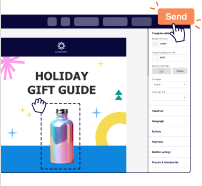Campaign Monitor Pricing: Honest Cost Analysis 2025
Let’s be honest — finding the right email marketing platform without breaking the bank isn’t easy. Campaign Monitor caught my attention because it actually delivers pretty solid value compared to what else is out there.
Their free plan is surprisingly generous — you get 1,000 subscribers and 12,000 emails monthly without spending a dime.
What I found particularly interesting is that they include AI tools (like subject line optimization) in ALL plans — even the free one! Most competitors reserve those fancy features for their premium tiers.
Jump up to just $9/month, and you’ll get 24/7 email support, multiple users can access the account, and you get those approval workflows that are super helpful for teams. I’ve looked at a bunch of alternatives, and these features are typically locked behind much pricier paywalls elsewhere.
If you’re running a small business or managing marketing for a team, Campaign Monitor seems particularly well-suited — it scales nicely without the enterprise-level costs that can make other platforms unaffordable.
Campaign Monitor Pricing at a Glance
Free Plan: $0 for 1,000 contacts and 12,000 emails/month. Includes core features, basic templates, and even those AI tools I mentioned.
Basic Plan: Starts at $9/month for 500+ contacts and 2,500–25,000 emails/month. No Campaign Monitor branding on your emails, A/B testing capability, and email support.
Unlimited Plan: From $29/month for 500+ contacts with unlimited emails. Adds automation features, time zone sending (super helpful for global campaigns), and multi-user access.
Premier Plan: Custom pricing based on your needs. Offers scalable contacts and emails, advanced segmentation tools, priority support, and a dedicated success manager.
Monthly Pricing Based on Contact List Size
Contact List Size
Lite Plan
Essentials Plan
Premier Plan
500
$9/month
$29/month
$149/month
1,000
$29/month
$59/month
$149/month
2,500
$49/month
$99/month
$149/month
5,000
$69/month
$149/month
$249/month
10,000
$99/month
$249/month
$399/month
15,000
$139/month
$349/month
$499/month
20,000
$159/month
$399/month
$599/month
25,000
$199/month
$499/month
$749/month
50,000
$319/month
$749/month
$989/month
75,000
–
$899/month
$1,189/month
100,000
–
$999/month
$1,389/month
125,000
–
$1,149/month
$1,589/month
150,000
–
$1,299/month
$1,789/month
175,000
–
$1,449/month
$1,989/month
200,000
–
$1,589/month
$2,189/month
Key Takeaways:
- The Lite Plan works best for smaller lists (under 50k contacts) and gives you the essentials without a hefty price tag.
- When you’re growing, the Essentials Plan adds more advanced features like automation – perfect for businesses scaling up their marketing efforts.
- The Premier Plan throws in premium features like send-time optimization and better support – great if you’ve got a serious marketing operation going.
The pricing increases as your contact list grows, which makes sense. If you’ve got more than 200,000 contacts, you’ll need to reach out to their team for custom enterprise pricing.
Feature Comparison Across Monthly Plans
Lite (from $9/month)
Essentials (from $29/month)
Premier (from $149/month)
Monthly Email Sends
2,500–25,000+
2,500–200,000+
2,500–200,000+
Number of Users
1
3
Unlimited
Audiences
1 list
Multiple lists
Unlimited + dynamic segments
Email Templates
Basic
Prebuilt + customizable
Full access + saved blocks
Automations
Basic journeys
Advanced workflows
Full automation suite
A/B Testing
No
Yes
Yes
Multivariate Testing
No
No
Yes
Advanced Segmentation
No
Basic filtering
Behavioral + engagement-based
Reporting
Basic metrics
Advanced engagement stats
Click maps + link tracking
Support
Email only
Email + live chat
Priority + phone support
SMS Marketing Add-on
No
No
Available
Predictive Insights
No
No
Available
Personalized Onboarding
No
No
Yes
Lite Plan
The Lite Plan starts at $9/month and it’s pretty good for individuals or really small businesses just getting started with email marketing. You can have up to 500 subscribers and send up to 2,500 emails each month.
I like that it includes their drag-and-drop email builder and some professionally designed templates. You’ll get basic reporting and can set up simple automations like welcome emails.
It’s a solid choice for freelancers or local businesses that just need to send occasional newsletters. The email design experience is actually quite good, even at this price point.
Plan Limitations:
- You can only have 1 user per account
- No A/B or multivariate testing options
- Just basic automation capabilities
- Limited reporting and analytics
- No SMS support or predictive tools
My Take: The Lite Plan is affordable and easy to use, but it’s definitely limited. You won’t be able to run sophisticated campaigns or make decisions based on detailed data. If you’re growing your list or need more advanced features, you’ll outgrow this plan pretty quickly.
Essentials Plan
The Essentials Plan kicks off at $29/month and feels designed for small to mid-sized businesses that need more powerful tools but don’t want to spend a fortune.
You can have up to 200,000 contacts, send more emails each month, and you unlock A/B testing, better templates, and multi-user access (up to 3 users).
This is where things get more interesting for marketing teams. You can start building data-driven campaigns using real-time metrics and create more sophisticated automation flows.
The live chat support and improved segmentation let you tailor messages based on how people behave and who they are. I particularly like the scheduled sending and time zone features — they can really boost your open rates across different regions.
Plan Limitations:
- No multivariate testing
- Lacks predictive insights and AI-driven tools
- SMS marketing isn’t included
- Automation customization has some limits
- No dedicated customer success manager
My Take: The Essentials Plan hits a sweet spot for most small teams. It’s got robust functionality without overwhelming complexity. That said, if you’re sending huge volumes or running an agency, you might eventually find its testing and automation options a bit constraining.
Premier Plan
The Premier Plan starts at $149/month and is Campaign Monitor’s top offering. It’s clearly aimed at large-scale marketers and enterprise teams. You get unlimited users, advanced automation workflows, multivariate testing, and behavior-based segmentation that’s quite powerful.
If you’re running frequent campaigns across multiple audiences, this plan makes a lot of sense. The send-time optimization, click maps, and SMS marketing add-ons help you make smarter decisions about when and how to reach people.
I appreciate that they include custom onboarding and predictive analytics — these features can really help refine campaigns over time.
Plan Limitations:
- The starting cost might be too high for smaller businesses
- SMS features require additional setup and cost
- Using the full API capabilities might require developer resources
- Limited third-party integration with predictive tools
- Possibly over-featured for simple campaign needs
My Take: The Premier Plan is built for scale and precision, but with that comes complexity. It’s best suited for companies with dedicated marketing teams or agencies managing multiple clients.
Smaller operations might find themselves paying for features they rarely use unless they’re regularly running sophisticated, segmented campaigns.
Pay-As-You-Go Plan (Cost per Email)
Credit Bundle
Price (USD)
Price per Credit
Emails per Bundle
Notes
5,000 credits
$150
$0.0300
5,000 emails
Ideal for small, occasional senders
10,000 credits
$290
$0.0290
10,000 emails
Moderate savings for growing needs
50,000 credits
$1,400
$0.0280
50,000 emails
Scales well for seasonal businesses
100,000 credits
$2,700
$0.0270
100,000 emails
Volume pricing starts to benefit here
500,000 credits
$12,500
$0.0250
500,000 emails
Cost-effective for high-volume senders
1,000,000 credits
$24,000
$0.0240
1,000,000 emails
Best suited for large campaigns
5,000,000 credits
$110,000
$0.0220
5,000,000 emails
Deep discounts for enterprise volumes
25,000,000 credits
Contact Sales
Custom Pricing
25,000,000 emails
Tailored enterprise pricing
How Pay As You Go Credits Work:
- Each credit = one email to one contact. So sending to 1,000 people uses 1,000 credits.
- I was happy to learn the credits don’t expire — super flexible if your sending patterns are irregular or seasonal.
- You get full access to Campaign Monitor’s core features with PAYG — the drag-and-drop editor, templates, automation, segmentation, and reporting.
This option makes a lot of sense for event marketers, agencies, or businesses that only send occasional campaigns and don’t want to commit to a monthly subscription.
Transactional Emails Pricing
Number of Blocks
Emails per Month
Price per Block (USD)
Total Monthly Cost (USD)
Notes
1 Block
25,000
$10.00
$10.00
Suitable for low-volume senders
5 Blocks
125,000
$9.50
$47.50
Great for apps and small businesses
10 Blocks
250,000
$9.00
$90.00
Ideal for scaling ecommerce brands
20 Blocks
500,000
$8.50
$170.00
Volume discount begins here
40 Blocks
1,000,000
$8.00
$320.00
Optimized for SaaS or marketplaces
80 Blocks
2,000,000
$7.50
$600.00
High-volume automation senders
160+ Blocks
4,000,000+
Custom Pricing
Contact Sales
Enterprise volume and SLA support
Understanding the Transactional Email Pricing:
- What’s a Block? A block equals 25,000 transactional emails per month. These aren’t promotional messages — they’re triggered emails like password resets, order confirmations, and shipping notifications.
- Volume-Based Pricing: I noticed the price per block decreases as you buy more blocks. This gives meaningful discounts to high-volume senders and makes each email cheaper at scale.
- Dedicated IP Option: You can add a dedicated IP for better deliverability and reputation control. It typically costs around $29/month. Not required, but worth considering if you send a lot of emails.
- Plan Eligibility: You can only add transactional email capabilities to Essentials and Premier plans — not available with the Lite plan.
Rollover Policy: Unused transactional emails don’t carry over to the next month. Your quota resets monthly, so you’ll want to forecast your needs accurately.


